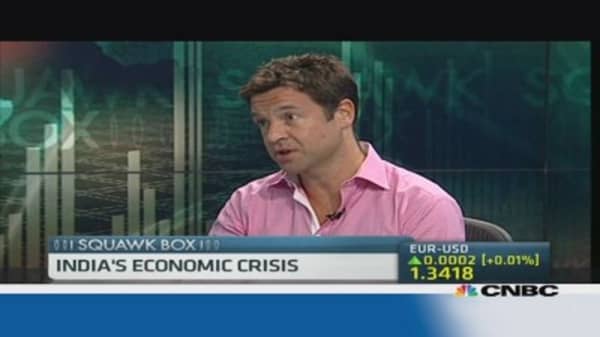Stuart Oakley, Managing Director, Asian Currency Trading, Nomura agreed. "It would help as a short term measure," Oakley told CNBC's 'Squawk Box' on Wednesday but ultimately policymakers needed to embark on major structural reform.
India is reportedly considering a plan to issue a new type of rupee-denominated bond to overseas investors to generate money needed to fund projects and check the rupee's slide against the U.S. dollar, according to the Wall Street Journal on Wednesday, citing an unnamed senior government official.
(Read more: Indian rupee hits record low; capital control fears grow)
A rupee-denominated bond would leave investors open to the risk of erosion in their investments if the rupee were to fall further, the Journal said.
Though it would represent a "major initiative," Eurasia Group's Anjalika Bardalai said the financial cost to the government of pursuing a foreign currency denominated debt sale has "risen markedly, with negative implications for fiscal policy."
Moreover, investors could perceive an overseas bond issue as a sign of financial distress, "and the potential benefit of new capital inflows could therefore be offset by an acceleration of the current self-perpetuating downward spiral," Bardalai explained.
(Read more: India 'not quite yet' a buying opportunity, Mobius says)
Mark Mobius, executive chairman of Templeton Emerging Markets Group said investors will inevitably demand a high yield to hold risky Indian debt and the government.
Such borrowing costs will reflect the "fundamentals of their ability to repay," Mobius said, adding India "will have to offer a higher rate…and that's not advantageous for the country."





